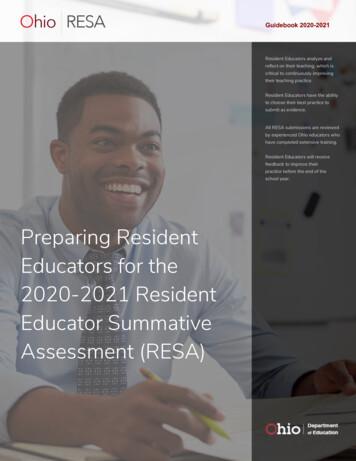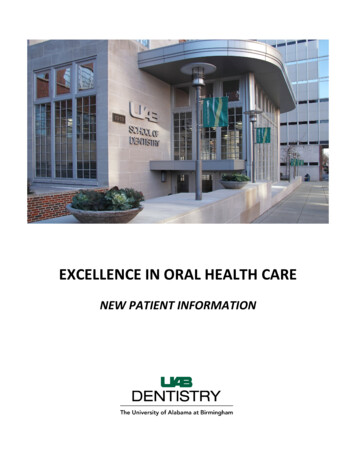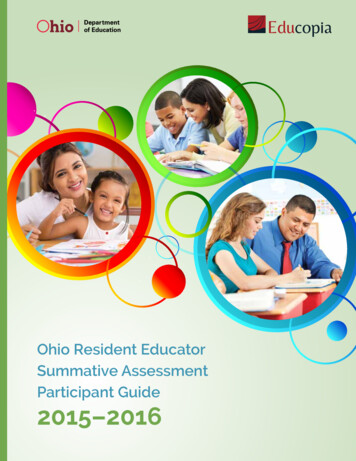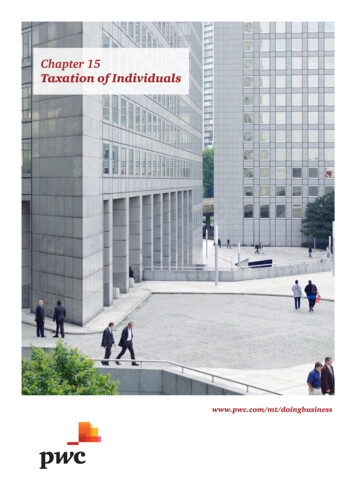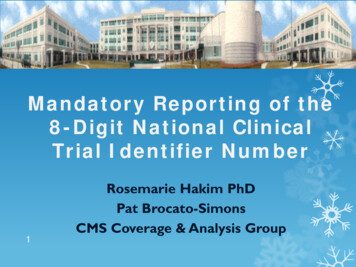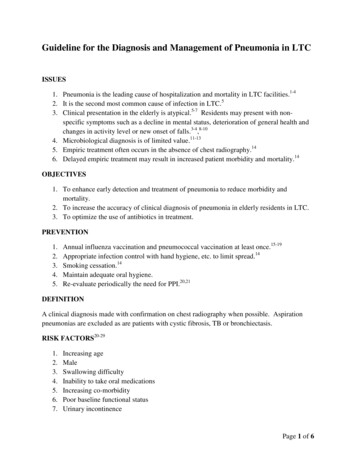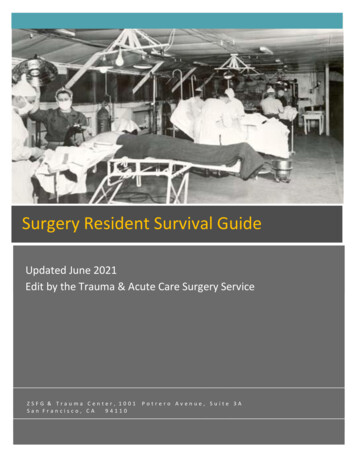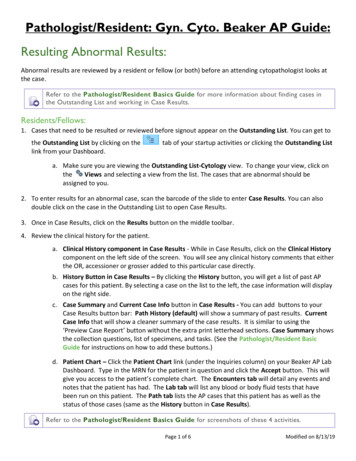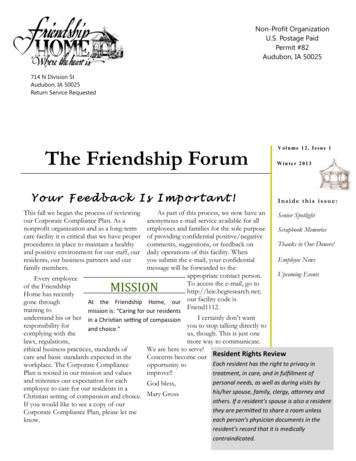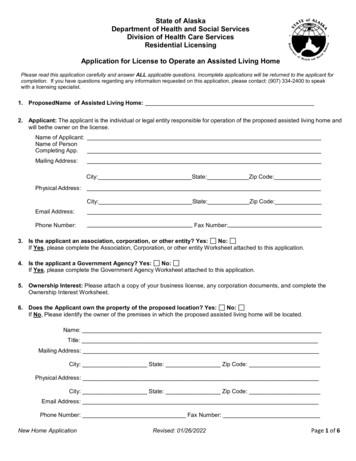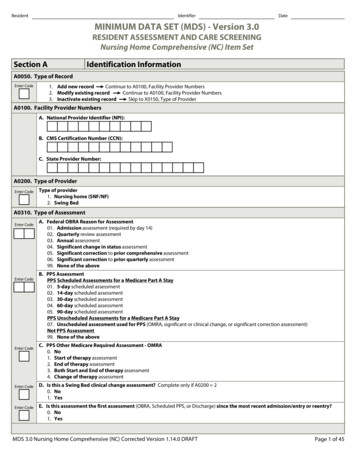
Transcription
ResidentIdentifierDateMINIMUM DATA SET (MDS) - Version 3.0.RESIDENT ASSESSMENT AND CARE SCREENING.Nursing Home Comprehensive (NC) Item Set.Section A.Identification Information.A0050. Type of Record.Enter Code1. Add new recordContinue to A0100, Facility Provider Numbers.2. Modify existing recordContinue to A0100, Facility Provider Numbers.3. Inactivate existing recordSkip to X0150, Type of Provider.A0100. Facility Provider Numbers.A. National Provider Identifier (NPI):B. CMS Certification Number (CCN):C. State Provider Number:A0200. Type of Provider.Enter CodeType of provider.1. Nursing home (SNF/NF).2. Swing Bed.A0310. Type of Assessment.Enter CodeEnter CodeEnter CodeEnter CodeEnter CodeA. Federal OBRA Reason for Assessment.01. Admission assessment (required by day 14).02. Quarterly review assessment.03. Annual assessment.04. Significant change in status assessment.05. Significant correction to prior comprehensive assessment.06. Significant correction to prior quarterly assessment.99. None of the above.B. PPS Assessment.PPS Scheduled Assessments for a Medicare Part A Stay.01. 5-day scheduled assessment.02. 14-day scheduled assessment.03. 30-day scheduled assessment.04. 60-day scheduled assessment.05. 90-day scheduled assessment.PPS Unscheduled Assessments for a Medicare Part A Stay.07. Unscheduled assessment used for PPS (OMRA, significant or clinical change, or significant correction assessment).Not PPS Assessment.99. None of the above.C. PPS Other Medicare Required Assessment - OMRA.0. No.1. Start of therapy assessment.2. End of therapy assessment.3. Both Start and End of therapy assessment.4. Change of therapy assessment.D. Is this a Swing Bed clinical change assessment? Complete only if A0200 2.0. No.1. Yes.E. Is this assessment the first assessment (OBRA, Scheduled PPS, or Discharge) since the most recent admission/entry or reentry?0. No.1. Yes.A0310 continued on next page.MDS 3.0 Nursing Home Comprehensive (NC) Corrected Version 1.14.0 DRAFTPage 1 of 45
ResidentIdentifierSection A.DateIdentification Information.A0310. Type of Assessment - Continued.Enter CodeEnter CodeEnter CodeF. Entry/discharge reporting01. Entry tracking record.10. Discharge assessment-return not anticipated.11. Discharge assessment-return anticipated.12. Death in facility tracking record.99. None of the above.G. Type of discharge. - Complete only if A0310F 10 or 11.1. Planned.2. Unplanned.H. Is this a SNF PPS Part A Discharge (End of Stay) Assessment?.0. No.1. Yes.A0410. Unit Certification or Licensure Designation.Enter Code1. Unit is neither Medicare nor Medicaid certified and MDS data is not required by the State.2. Unit is neither Medicare nor Medicaid certified but MDS data is required by the State.3. Unit is Medicare and/or Medicaid certified.A0500. Legal Name of Resident.A. First name:B. Middle initial:C. Last name:D. Suffix:A0600. Social Security and Medicare Numbers.A. Social Security Number:B. Medicare number (or comparable railroad insurance number):A0700. Medicaid Number - Enter " " if pending, "N" if not a Medicaid recipient.A0800. Gender.Enter Code1. Male.2. Female.A0900. Birth Date.MonthDayYearA1000. Race/Ethnicity.Check all that apply.A. American Indian or Alaska Native.B. Asian.C. Black or African American.D. Hispanic or Latino.E. Native Hawaiian or Other Pacific Islander.F. White.MDS 3.0 Nursing Home Comprehensive (NC) Corrected Version 1.14.0 DRAFTPage 2 of 45
ResidentIdentifierSection A.DateIdentification Information.A1100. Language.Enter CodeA. Does the resident need or want an interpreter to communicate with a doctor or health care staff?0. NoSkip to A1200, Marital Status.1. YesSpecify in A1100B, Preferred language.Skip to A1200, Marital Status.9. Unable to determine.B. Preferred language:A1200. Marital Status.Enter Code1.2.3.4.5.Never married.Married.Widowed.Separated.Divorced.A1300. Optional Resident Items.A. Medical record number:B. Room number:C. Name by which resident prefers to be addressed:D. Lifetime occupation(s) - put "/" between two occupations:A1500. Preadmission Screening and Resident Review (PASRR).Complete only if A0310A 01, 03, 04, or 05Enter CodeIs the resident currently considered by the state level II PASRR process to have serious mental illness and/or intellectual disability("mental retardation" in federal regulation) or a related condition?0. NoSkip to A1550, Conditions Related to ID/DD Status.1. YesContinue to A1510, Level II Preadmission Screening and Resident Review (PASRR) Conditions.9. Not a Medicaid-certified unitSkip to A1550, Conditions Related to ID/DD Status.A1510. Level II Preadmission Screening and Resident Review (PASRR) Conditions.Complete only if A0310A 01, 03, 04, or 05.Check all that apply.A. Serious mental illness.B. Intellectual Disability ("mental retardation" in federal regulation).C. Other related conditions.MDS 3.0 Nursing Home Comprehensive (NC) Corrected Version 1.14.0 DRAFTPage 3 of 45
ResidentIdentifierSection A.DateIdentification Information.A1550. Conditions Related to ID/DD Status.If the resident is 22 years of age or older, complete only if A0310A 01.If the resident is 21 years of age or younger, complete only if A0310A 01, 03, 04, or 05.Check all conditions that are related to ID/DD status that were manifested before age 22, and are likely to continue indefinitely.ID/DD With Organic Condition.A. Down syndrome.B. Autism.C. Epilepsy.D. Other organic condition related to ID/DD.ID/DD Without Organic Condition.E. ID/DD with no organic condition.No ID/DD.Z. None of the above.Most Recent Admission/Entry or Reentry into this Facility.A1600. Entry Date.MonthDayYearA1700. Type of Entry.Enter Code1. Admission.2. Reentry.A1800. Entered From.Enter Code01.02.03.04.05.06.07.09.99.Community (private home/apt., board/care, assisted living, group home).Another nursing home or swing bed.Acute hospital.Psychiatric hospital.Inpatient rehabilitation facility.ID/DD facility.Hospice.Long Term Care Hospital (LTCH).Other.A1900. Admission Date (Date this episode of care in this facility began).MonthDayYearA2000. Discharge Date.Complete only if A0310F 10, 11, or 12MonthDayYearMDS 3.0 Nursing Home Comprehensive (NC) Corrected Version 1.14.0 DRAFTPage 4 of 45
ResidentIdentifierSection A.DateIdentification Information.A2100. Discharge Status.Complete only if A0310F 10, 11, or 12Enter Code01.02.03.04.05.06.07.08.09.99.Community (private home/apt., board/care, assisted living, group home).Another nursing home or swing bed.Acute hospital.Psychiatric hospital.Inpatient rehabilitation facility.ID/DD facility.Hospice.Deceased.Long Term Care Hospital (LTCH).Other.A2200. Previous Assessment Reference Date for Significant Correction.Complete only if A0310A 05 or 06.MonthDayYearA2300. Assessment Reference Date.Observation end date:MonthDayYearA2400. Medicare Stay.Enter CodeA. Has the resident had a Medicare-covered stay since the most recent entry?0. NoSkip to B0100, Comatose.Continue to A2400B, Start date of most recent Medicare stay.1. YesB. Start date of most recent Medicare stay:MonthDayYearC. End date of most recent Medicare stay - Enter dashes if stay is ongoing:MonthDayYearMDS 3.0 Nursing Home Comprehensive (NC) Corrected Version 1.14.0 DRAFTPage 5 of 45
ResidentIdentifierDateLook back period for all items is 7 days unless another time frame is indicated.Section B.Hearing, Speech, and Vision.B0100. Comatose.Enter CodePersistent vegetative state/no discernible consciousness.Continue to B0200, Hearing.0. No1. YesSkip to G0110, Activities of Daily Living (ADL) Assistance.B0200. Hearing.Enter CodeAbility to hear (with hearing aid or hearing appliances if normally used).0. Adequate - no difficulty in normal conversation, social interaction, listening to TV.1. Minimal difficulty - difficulty in some environments (e.g., when person speaks softly or setting is noisy).2. Moderate difficulty - speaker has to increase volume and speak distinctly.3. Highly impaired - absence of useful hearing.B0300. Hearing Aid.Enter CodeHearing aid or other hearing appliance used in completing B0200, Hearing.0. No.1. Yes.B0600. Speech Clarity.Enter CodeSelect best description of speech pattern.0. Clear speech - distinct intelligible words.1. Unclear speech - slurred or mumbled words.2. No speech - absence of spoken words.B0700. Makes Self Understood.Enter CodeAbility to express ideas and wants, consider both verbal and non-verbal expression.0. Understood.1. Usually understood - difficulty communicating some words or finishing thoughts but is able if prompted or given time.2. Sometimes understood - ability is limited to making concrete requests.3. Rarely/never understood.B0800. Ability To Understand Others.Enter CodeUnderstanding verbal content, however able (with hearing aid or device if used).0. Understands - clear comprehension.1. Usually understands - misses some part/intent of message but comprehends most conversation.2. Sometimes understands - responds adequately to simple, direct communication only.3. Rarely/never understands.B1000. Vision.Enter CodeAbility to see in adequate light (with glasses or other visual appliances).0. Adequate - sees fine detail, such as regular print in newspapers/books.1. Impaired - sees large print, but not regular print in newspapers/books.2. Moderately impaired - limited vision; not able to see newspaper headlines but can identify objects.3. Highly impaired - object identification in question, but eyes appear to follow objects.4. Severely impaired - no vision or sees only light, colors or shapes; eyes do not appear to follow objects.B1200. Corrective Lenses.Enter CodeCorrective lenses (contacts, glasses, or magnifying glass) used in completing B1000, Vision.0. No.1. Yes.MDS 3.0 Nursing Home Comprehensive (NC) Corrected Version 1.14.0 DRAFTPage 6 of 45
ResidentIdentifierSection C.DateCognitive Patterns.C0100. Should Brief Interview for Mental Status (C0200-C0500) be Conducted?Attempt to conduct interview with all residents.Enter Code0. No (resident is rarely/never understood)Skip to and complete C0700-C1000, Staff Assessment for Mental Status.1. YesContinue to C0200, Repetition of Three Words.Brief Interview for Mental Status (BIMS).C0200. Repetition of Three Words.Ask resident: “I am going to say three words for you to remember. Please repeat the words after I have said all three.The words are: sock, blue, and bed. Now tell me the three words.”Enter CodeNumber of words repeated after first attempt.0. None.1. One.2. Two.3. Three.After the resident's first attempt, repeat the words using cues ("sock, something to wear; blue, a color; bed, a pieceof furniture"). You may repeat the words up to two more times.C0300. Temporal Orientation (orientation to year, month, and day).Ask resident: "Please tell me what year it is right now."Enter CodeEnter CodeEnter CodeA. Able to report correct year.0. Missed by 5 years or no answer.1. Missed by 2-5 years.2. Missed by 1 year.3. Correct.Ask resident: "What month are we in right now?"B. Able to report correct month.0. Missed by 1 month or no answer.1. Missed by 6 days to 1 month.2. Accurate within 5 days.Ask resident: "What day of the week is today?"C. Able to report correct day of the week.0. Incorrect or no answer.1. Correct.C0400. Recall.Enter CodeEnter CodeEnter CodeAsk resident: "Let's go back to an earlier question. What were those three words that I asked you to repeat?"If unable to remember a word, give cue (something to wear; a color; a piece of furniture) for that word.A. Able to recall "sock".0. No - could not recall.1. Yes, after cueing ("something to wear").2. Yes, no cue required.B. Able to recall "blue".0. No - could not recall.1. Yes, after cueing ("a color").2. Yes, no cue required.C. Able to recall "bed".0. No - could not recall.1. Yes, after cueing ("a piece of furniture").2. Yes, no cue required.C0500. BIMS Summary Score.Enter ScoreAdd scores for questions C0200-C0400 and fill in total score (00-15).Enter 99 if the resident was unable to complete the interview.MDS 3.0 Nursing Home Comprehensive (NC) Corrected Version 1.14.0 DRAFTPage 7 of 45
ResidentIdentifierSection C.DateCognitive Patterns.C0600. Should the Staff Assessment for Mental Status (C0700 - C1000) be Conducted?Enter Code0. No (resident was able to complete Brief Interview for Mental Status )1. Yes (resident was unable to complete Brief Interview for Mental Status)Skip to C1310, Signs and Symptoms of Delirium.Continue to C0700, Short-term Memory OK.Staff Assessment for Mental Status.Do not conduct if Brief Interview for Mental Status (C0200-C0500) was completed.C0700. Short-term Memory OK.Enter CodeSeems or appears to recall after 5 minutes.0. Memory OK.1. Memory problem.C0800. Long-term Memory OK.Enter CodeSeems or appears to recall long past.0. Memory OK.1. Memory problem.C0900. Memory/Recall Ability.Check all that the resident was normally able to recall.A. Current season.B. Location of own room.C. Staff names and faces.D. That he or she is in a nursing home/hospital swing bed.Z. None of the above were recalled.C1000. Cognitive Skills for Daily Decision Making.Enter CodeMade decisions regarding tasks of daily life.0. Independent - decisions consistent/reasonable.1. Modified independence - some difficulty in new situations only.2. Moderately impaired - decisions poor; cues/supervision required.3. Severely impaired - never/rarely made decisions.Delirium.C1310. Signs and Symptoms of Delirium (from CAM ).Code after completing Brief Interview for Mental Status or Staff Assessment, and reviewing medical record.A. Acute Onset Mental Status Change.Enter CodeIs there evidence of an acute change in mental status from the resident's baseline?0. No.1. Yes.Enter Codes in Boxes.Coding:0. Behavior not present .1. Behavior continuouslypresent, does notfluctuate.2. Behavior present,fluctuates (comes andgoes, changes in severity).B. Inattention - Did the resident have difficulty focusing attention, for example being easily distractible, orhaving difficulty keeping track of what was being said?C. Disorganized thinking - Was the resident's thinking disorganized or incoherent (rambling or irrelevantconversation, unclear or illogical flow of ideas, or unpredictable switching from subject to subject)?D. Altered level of consciousness - Did the resident have altered level of consciousness as indicated byany of the following criteria? vigilant - startled easily to any sound or touch. lethargic - repeatedly dozed off when being asked questions, but responded to voice or touch. stuporous - very difficult to arouse and keep aroused for the interview. comatose - could not be aroused.Confusion Assessment Method. 1988, 2003, Hospital Elder Life Program. All rights reserved. Adapted from: Inouye SK et al. Ann Intern Med. 1990; 113:941-8. Used with permission.MDS 3.0 Nursing Home Comprehensive (NC) Corrected Version 1.14.0 DRAFTPage 8 of 45
ResidentIdentifierSection D.DateMood.D0100. Should Resident Mood Interview be Conducted? - Attempt to conduct interview with all residents.Enter Code0. No (resident is rarely/never understood)Skip to and complete D0500-D0600, Staff Assessment of Resident Mood(PHQ-9-OV).1. YesContinue to D0200, Resident Mood Interview (PHQ-9 ).D0200. Resident Mood Interview (PHQ-9 ).Say to resident: "Over the last 2 weeks, have you been bothered by any of the following problems?"If symptom is present, enter 1 (yes) in column 1, Symptom Presence.If yes in column 1, then ask the resident: "About how often have you been bothered by this?"Read and show the resident a card with the symptom frequency choices. Indicate response in column 2, Symptom Frequency.1. Symptom Presence.0. No (enter 0 in column 2).1. Yes (enter 0-3 in column 2).9. No response (leave column 2blank).2. Symptom Frequency.0. Never or 1 day.1. 2-6 days (several days).2. 7-11 days (half or more of the days).3. 12-14 days (nearly every day).1.SymptomPresence.2.SymptomFrequency.Enter Scores in BoxesA. Little interest or pleasure in doing things.B. Feeling down, depressed, or hopeless.C. Trouble falling or staying asleep, or sleeping too much.D. Feeling tired or having little energy.E. Poor appetite or overeating.F. Feeling bad about yourself - or that you are a failure or have let yourself or your familydown.G. Trouble concentrating on things, such as reading the newspaper or watching television.H. Moving or speaking so slowly that other people could have noticed. Or the opposite being so fidgety or restless that you have been moving around a lot more than usual.I.Thoughts that you would be better off dead, or of hurting yourself in some way.D0300. Total Severity Score.Enter ScoreAdd scores for all frequency responses in Column 2, Symptom Frequency. Total score must be between 00 and 27.Enter 99 if unable to complete interview (i.e., Symptom Frequency is blank for 3 or more items).D0350. Safety Notification - Complete only if D0200I1 1 indicating possibility of resident self harm.Enter CodeWas responsible staff or provider informed that there is a potential for resident self harm?0. No.1. Yes.Copyright Pfizer Inc. All rights reserved. Reproduced with permission.MDS 3.0 Nursing Home Comprehensive (NC) Corrected Version 1.14.0 DRAFTPage 9 of 45
ResidentIdentifierSection D.DateMood.D0500. Staff Assessment of Resident Mood (PHQ-9-OV*).Do not conduct if Resident Mood Interview (D0200-D0300) was completed.Over the last 2 weeks, did the resident have any of the following problems or behaviors?If symptom is present, enter 1 (yes) in column 1, Symptom Presence.Then move to column 2, Symptom Frequency, and indicate symptom frequency.1. Symptom Presence.0. No (enter 0 in column 2).1. Yes (enter 0-3 in column 2).2. Symptom Frequency.0. Never or 1 day.1. 2-6 days (several days).2. 7-11 days (half or more of the days).3. 12-14 days (nearly every day).1.SymptomPresence.2.SymptomFrequency.Enter Scores in BoxesA. Little interest or pleasure in doing things.B. Feeling or appearing down, depressed, or hopeless.C. Trouble falling or staying asleep, or sleeping too much.D. Feeling tired or having little energy.E. Poor appetite or overeating.F. Indicating that s/he feels bad about self, is a failure, or has let self or family down.G. Trouble concentrating on things, such as reading the newspaper or watching television.H. Moving or speaking so slowly that other people have noticed. Or the opposite - being so fidgetyor restless that s/he has been moving around a lot more than usual.I.States that life isn't worth living, wishes for death, or attempts to harm self.J.Being short-tempered, easily annoyed.D0600. Total Severity Score.Enter ScoreAdd scores for all frequency responses in Column 2, Symptom Frequency. Total score must be between 00 and 30.D0650. Safety Notification - Complete only if D0500I1 1 indicating possibility of resident self harm.Enter CodeWas responsible staff or provider informed that there is a potential for resident self harm?0. No.1. Yes.* Copyright Pfizer Inc. All rights reserved.MDS 3.0 Nursing Home Comprehensive (NC) Corrected Version 1.14.0 DRAFTPage 10 of 45
ResidentIdentifierSection E.DateBehavior.E0100. Potential Indicators of Psychosis.Check all that applyA. Hallucinations (perceptual experiences in the absence of real external sensory stimuli).B. Delusions (misconceptions or beliefs that are firmly held, contrary to reality).Z. None of the above.Behavioral Symptoms.E0200. Behavioral Symptom - Presence & Frequency.Note presence of symptoms and their frequency.Enter Codes in Boxes.Coding:0. Behavior not exhibited.1. Behavior of this type occurred 1 to 3 days.2. Behavior of this type occurred 4 to 6 days,but less than daily.3. Behavior of this type occurred daily.A.Physical behavioral symptoms directed toward others (e.g., hitting,kicking, pushing, scratching, grabbing, abusing others sexually).B.Verbal behavioral symptoms directed toward others (e.g., threateningothers, screaming at others, cursing at others).C.Other behavioral symptoms not directed toward others (e.g., physicalsymptoms such as hitting or scratching self, pacing, rummaging, publicsexual acts, disrobing in public, throwing or smearing food or bodily wastes,or verbal/vocal symptoms like screaming, disruptive sounds).E0300. Overall Presence of Behavioral Symptoms.Enter CodeWere any behavioral symptoms in questions E0200 coded 1, 2, or 3?0. NoSkip to E0800, Rejection of Care.1. YesConsidering all of E0200, Behavioral Symptoms, answer E0500 and E0600 below.E0500. Impact on Resident.Enter CodeDid any of the identified symptom(s):A. Put the resident at significant risk for physical illness or injury?0. No.1. Yes.Enter CodeB. Significantly interfere with the resident's care?0. No.1. Yes.Enter CodeC. Significantly interfere with the resident's participation in activities or social interactions?0. No.1. Yes.E0600. Impact on Others.Enter CodeDid any of the identified symptom(s):A. Put others at significant risk for physical injury?0. No.1. Yes.Enter CodeB. Significantly intrude on the privacy or activity of others?0. No.1. Yes.Enter CodeC. Significantly disrupt care or living environment?0. No.1. Yes.E0800. Rejection of Care - Presence & Frequency.Enter CodeDid the resident reject evaluation or care (e.g., bloodwork, taking medications, ADL assistance) that is necessary to achieve theresident's goals for health and well-being? Do not include behaviors that have already been addressed (e.g., by discussion or careplanning with the resident or family), and determined to be consistent with resident values, preferences, or goals.0. Behavior not exhibited.1. Behavior of this type occurred 1 to 3 days.2. Behavior of this type occurred 4 to 6 days, but less than daily.3. Behavior of this type occurred daily.MDS 3.0 Nursing Home Comprehensive (NC) Corrected Version 1.14.0 DRAFTPage 11 of 45
ResidentIdentifierSection E.DateBehavior.E0900. Wandering - Presence & Frequency.Enter CodeHas the resident wandered?Skip to E1100, Change in Behavioral or Other Symptoms.0. Behavior not exhibited1. Behavior of this type occurred 1 to 3 days.2. Behavior of this type occurred 4 to 6 days, but less than daily.3. Behavior of this type occurred daily.E1000. Wandering - Impact.Enter CodeEnter CodeA. Does the wandering place the resident at significant risk of getting to a potentially dangerous place (e.g., stairs, outside of thefacility)?0. No.1. Yes.B. Does the wandering significantly intrude on the privacy or activities of others?0. No.1. Yes.E1100. Change in Behavior or Other Symptoms.Consider all of the symptoms assessed in items E0100 through E1000.Enter CodeHow does resident's current behavior status, care rejection, or wandering compare to prior assessment (OBRA or Scheduled PPS)?0. Same.1. Improved.2. Worse.3. N/A because no prior MDS assessment.MDS 3.0 Nursing Home Comprehensive (NC) Corrected Version 1.14.0 DRAFTPage 12 of 45
ResidentIdentifierSection F.DatePreferences for Customary Routine and Activities.F0300. Should Interview for Daily and Activity Preferences be Conducted? - Attempt to interview all residents able to communicate.If resident is unable to complete, attempt to complete interview with family member or significant other.Enter Code0. No (resident is rarely/never understood and family/significant other not available)Assessment of Daily and Activity Preferences.1. YesContinue to F0400, Interview for Daily Preferences.Skip to and complete F0800, StaffF0400. Interview for Daily Preferences.Show resident the response options and say: "While you are in this facility."Enter Codes in Boxes.A. how important is it to you to choose what clothes to wear?B. how important is it to you to take care of your personal belongings or things?Coding:1. Very important.2. Somewhat important.3. Not very important.4. Not important at all.5. Important, but can't do or nochoice.9. No response or non-responsive.C. how important is it to you to choose between a tub bath, shower, bed bath, orsponge bath?D. how important is it to you to have snacks available between meals?E. how important is it to you to choose your own bedtime?F. how important is it to you to have your family or a close friend involved indiscussions about your care?G. how important is it to you to be able to use the phone in private?H. how important is it to you to have a place to lock your things to keep them safe?F0500. Interview for Activity Preferences.Show resident the response options and say: "While you are in this facility."Enter Codes in BoxesA. how important is it to you to have books, newspapers, and magazines to read?B. how important is it to you to listen to music you like?Coding:1. Very important.2. Somewhat important.3. Not very important.4. Not important at all.5. Important, but can't do or nochoice.9. No response or non-responsive.C. how important is it to you to be around animals such as pets?D. how important is it to you to keep up with the news?E. how important is it to you to do things with groups of people?F. how important is it to you to do your favorite activities?G. how important is it to you to go outside to get fresh air when the weather is good?H. how important is it to you to participate in religious services or practices?F0600. Daily and Activity Preferences Primary Respondent.Enter CodeIndicate primary respondent for Daily and Activity Preferences (F0400 and F0500).1. Resident.2. Family or significant other (close friend or other representative).9. Interview could not be completed by resident or family/significant other ("No response" to 3 or more items").MDS 3.0 Nursing Home Comprehensive (NC) Corrected Version 1.14.0 DRAFTPage 13 of 45
ResidentIdentifierSection F.DatePreferences for Customary Routine and Activities.F0700. Should the Staff Assessment of Daily and Activity Preferences be Conducted?0. No (because Interview for Daily and Activity Preferences (F0400 and F0500) was completed by resident or family/significantother)Skip to and complete G0110, Activities of Daily Living (ADL) Assistance.1. Yes (because 3 or more items in Interview for Daily and Activity Preferences (F0400 and F0500) were not completed by residentor family/significant other)Continue to F0800, Staff Assessment of Daily and Activity Preferences.Enter CodeF0800. Staff Assessment of Daily and Activity Preferences.Do not conduct if Interview for Daily and Activity Preferences (F0400-F0500) was completed.Resident Prefers:Check all that apply.A. Choosing clothes to wear.B. Caring for personal belongings.C. Receiving tub bath.D. Receiving shower.E.Receiving bed bath.F.Receiving sponge bath.G. Snacks between meals.H. Staying up past 8:00 p.m.I.Family or significant other involvement in care discussions.J.Use of phone in private.K. Place to lock personal belongings.L.Reading books, newspapers, or magazines.M. Listening to music.N. Being around animals such as pets.O. Keeping up with the news.P. Doing things with groups of people.Q. Participating in favorite activities.R. Spending time away from the nursing home.S. Spending time outdoors.T. Participating in religious activities or practices.Z. None of the above.MDS 3.0 Nursing Home Comprehensive (NC) Corrected Version 1.14.0 DRAFTPage 14 of 45
ResidentSection G.IdentifierDateFunctional Status.G0110. Activities of Daily Living (ADL) Assistance.Refer to the ADL flow chart in the RAI manual to facilitate accurate coding.Instructions for Rule of 3 When an activity occurs three times at any one given level, code that level. When an activity occurs three times at multiple levels, code the most dependent, exceptions are total dependence (4), activity must require full assistevery time, and activity did not occur (8), activity must not have occurred at all. Example, three times extensive assistance (3) and three times limitedassistance (2), code extensive assistance (3). When an activity occurs at various levels, but not three times at any given level, apply the following: When there is a combination of full staff performance, and extensive assistance, code extensive assistance. When there is a combination of full staff performance, weight bearing assistance and/or non-weight bearing assistance code limited assistance (2).If none of the above are met, code supervision.1. ADL Self-Performance.Code for resident's performance over all shifts - not including setup. If the ADL activityoccurred 3 or more times at various levels of assistance, code the most dependent - except fortotal dependence, which requires full staff performance every time.2. ADL Support Provided.Code for most support provided over allshifts; code regardless of resident's selfperformance classification.Coding:Activity Occurred 3 or More Times.0. Independent - no help or staff oversight at any time.1. Supervision - oversight, encouragement or cueing.2. Limited assistance - resident highly involved in activity; staff provide guided maneuveringof limbs or other non-weight-bearing assistance.3. Extensive assistance - resident involved in activity, staff provide weight-bearing support.4. Total dependence - full staff performance every time during entire 7-day period.Coding:0. No setup or physical help from staff.1. Setup help only.2. One person physical assist.3. Two persons physical assist.8. ADL activity itself did not occur or familyand/or non-facility staff provided care100% of the time for that activity over theentire 7-day period.Activity Occurred 2 or Fewer Times.7. Activity occurred only once or twice - activity did occur but only once or twice.8. Activity did not occur - activity did not occur or family and/or non-facility staff providedcare 100% of the time for that activity over the entire 7-day period.1.Self-Performance.2.Support.Enter Codes in BoxesA. Bed mobility - how resident moves to and from lying position, turns side to side, andpositions body while in bed or alternate sleep furniture.B. Transfer - how resident moves between surfaces including to or from: bed, chair, wheelc
tracking record. 10. Discharge assessment-return not anticipated. 11. Discharge assessment-return anticipated. 12. Death in facility tracking record. 99. None of the above. Enter Code. G. Type of discharge. - Complete only if A0310F 10 or 11. 1. Planned. 2. Unplanned. Enter Code. H. Is this a SNF PPS Part A Discharge (End of Stay) Assessment?
